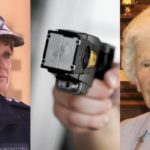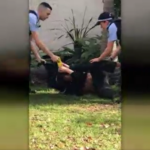NSW Police Officer Charged with Assault Over Fatal Tasering of Great-Grandmother

The New South Wales police officer who tasered a 95-year old woman at an aged care facility has been charged with recklessly causing grievous bodily harm, after the great-grandmother who suffered from dementia died in hospital as a result of fracturing her skull when she fell and hit the floor.
The story so far
Two officers attended an aged care facility in Cooma last week after staff reported that Clare Nowland was refusing to drop a steak knife.
Police say that when they arrived, Ms Nowland refused to put down the knife.
She reportedly weighed 45 kilograms and was on a walking frame at the time.
One of the officers, 33-year old senior constable Kristian White, then saw fit to discharge a taser at the elderly woman, causing her to fall to the floor and sustain critical head injuries.
She was admitted to hospital in a critical condition and succumbed to her injuries yesterday.
Public outrage
The incident has caused a significant public backlash, with many asking why police officers would need to discharge a taser against a frail, elderly woman who needed a frame to walk rather than use other means to subdue her.
“If you can’t disarm a 95 year old woman who weight 45kg and is 5 foot 2 inches and has dementia without a tazer, you’re in the wrong job”, wrote one social media user.
“Disgraceful! How menacing can a 95yo who is 45kg & walks with walking frame be?”, wrote another.
The outrage was compounded when NSW Police Commissioner, Karen Webb, fronted the media and said she ‘hasn’t’ and ‘won’t’ be watching footage of the incident until a full investigation takes place and that – unlike the release of footage seen as favourable to the police in many other instances – the body camera footage would not be released to the public.
Tasers can be fatal
Tasers have long been known to have potentially deadly effects, having been linked to many cases of cardiac arrest and other severe injuries.
Despite this, police officers have seen fit to taser children as young as 12-years old, those suffering from mental health conditions and many situations where it is difficult to see their use as necessary.
Police have even been known to delete their own body camera footage after discharging the weapons against members of the public.
Charged with assault
Officer White has now been charged with a number of assault charges, the most serious of which is recklessly causing grievous bodily harm.
He is scheduled to appear in Cooma Local Court on 5 July 2023.
The offence of recklessly causing grievous bodily harm
Recklessly causing grievous bodily harm is an offence under section 35 of the Crimes Act 1900 which carries a maximum penalty of 10 years in prison.
To establish the offence, the prosecution must prove beyond reasonable doubt that:
- You caused grievous bodily harm to another person, and
- You did so recklessly.
‘Grievous bodily harm’ (GBH) is defined as ‘very serious harm’ it includes, but is not limited to:
- Any permanent or serious disfigurement,
- The destruction of a foetus, other than by a medical procedure, and
- Any grievous bodily disease.
You were ‘reckless’ if you foresaw the possibility of inflicting GBH which means you realised GBH may possibly be inflicted, but you went ahead with your actions regardless.
The maximum penalty increases to 14 years in prison where you committed the offence with another person or persons.
Defences to the charge include:
Appropriate charge?
Given Ms Nowland has now died from her injuries, many are asking whether the charge will be upgraded to murder.
Indeed, this charge is appropriate where a person’s voluntary act (the use of a taser) caused another’s death (the head injury that placed Ms Nowland in a critical condition leading to her death) in circumstances where the perpetrator acted “with reckless indifference to human life” (as could be established given Ms Nowland’s condition and the known dangers of tasers).
The offence of murder carries a maximum penalty of life imprisonment.
Alternatively, a charge of manslaughter could be brought, specifically voluntary manslaughter for acting with excessive self-defence.
That offence carries a maximum penalty of 25 years in prison.
Self-defence?
Self-defence is a complete defence to both murder and manslaughter charges, which means a defendant must be found not guilty if the defence is made out.
The defence applies where a person believed his or her actions were carried out to defend himself or herself, or another person, and the conduct was a reasonable response to the circumstances as he or she perceived them.
In the context of a murder charge, and although footage of the incident has not been released, it is difficult to imagine a situation where discharging a taser against a 95-year old woman who is 45 kilograms in weight, 5 feet 2 inches in height, suffers from dementia, is on a walking frame due to difficulties moving could be considered a reasonable response despite the fact she was holding steak knife, particularly given the 33-year old senior constable that used the weapon is a heavily-set officer (judging by pictures in the media) who is presumably experienced in his job (given his rank) and is in the presence of another officer.






